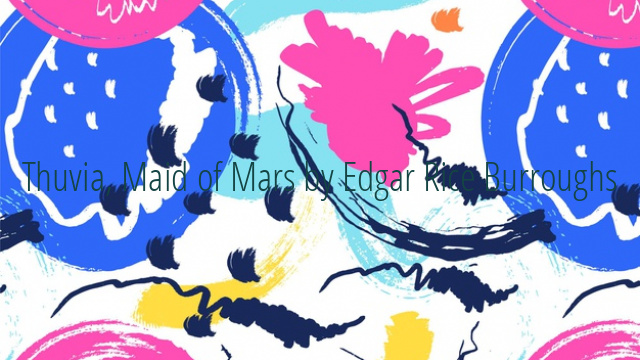
Thuvia, Maid of Mars by Edgar Rice Burroughs
Chapter V: The Fair Race
Downward along a smooth, broad floor led the strange tunnel, for such Carthoris was now convinced was the nature of the shaft he at first had thought but a cave.
Before him he could hear the occasional low moans of the banth, and presently from behind came a similar uncanny note. Another banth had entered the passageway on HIS trail!
His position was anything but pleasant. His eyes could not penetrate the darkness even to the distinguishing of his hand before his face, while the banths, he knew, could see quite well, though absence of light were utter.
No other sounds came to his ears than the dismal, bloodthirsty moanings of the beast ahead and the beast behind.
The tunnel had led straight, from where he had entered it beneath the side of the rock furthest from the unscaleable cliffs, toward the mighty barrier that had baffled him so long.
Now it was running almost level, and presently he noted a gradual ascent.
The beast behind him was gaining upon him, crowding him perilously close upon the heels of the beast in front. Presently he should have to do battle with one, or both. More firmly he gripped his weapon.
Now he could hear the breathing of the banth at his heels. Not for much longer could he delay the encounter.
Long since he had become assured that the tunnel led beneath the cliffs to the opposite side of the barrier, and he had hoped that he might reach the moonlit open before being compelled to grapple with either of the monsters.
The sun had been setting as he entered the tunnel, and the way had been sufficiently long to assure him that darkness now reigned upon the world without. He glanced behind him. Blazing out of the darkness, seemingly not ten paces behind, glared two flaming points of fire. As the savage eyes met his, the beast emitted a frightful roar and then he charged.
To face that savage mountain of onrushing ferocity, to stand unshaken before the hideous fangs that he knew were bared in slavering blood-thirstiness, though he could not see them, required nerves of steel; but of such were the nerves of Carthoris of Helium.
He had the brute’s eyes to guide his point, and, as true as the sword hand of his mighty sire, his guided the keen point to one of those blazing orbs, even as he leaped lightly to one side.
With a hideous scream of pain and rage, the wounded banth hurtled, clawing, past him. Then it turned to charge once more; but this time Carthoris saw but a single gleaming point of fiery hate directed upon him.
Again the needle point met its flashing target. Again the horrid cry of the stricken beast reverberated through the rocky tunnel, shocking in its torture-laden shrillness, deafening in its terrific volume.
But now, as it turned to charge again, the man had no guide whereby to direct his point. He heard the scraping of the padded feet upon the rocky floor. He knew the thing was charging down upon him once again, but he could see nothing.
Yet, if he could not see his antagonist, neither could his antagonist now see him.
Leaping, as he thought, to the exact centre of the tunnel, he held his sword point ready on a line with the beast’s chest. It was all that he could do, hoping that chance might send the point into the savage heart as he went down beneath the great body.
So quickly was the thing over that Carthoris could scarce believe his senses as the mighty body rushed madly past him. Either he had not placed himself in the centre of the tunnel, or else the blinded banth had erred in its calculations.
However, the huge body missed him by a foot, and the creature continued on down the tunnel as though in pursuit of the prey that had eluded him.
Carthoris, too, followed the same direction, nor was it long before his heart was gladdened by the sight of the moonlit exit from the long, dark passage.
Before him lay a deep hollow, entirely surrounded by gigantic cliffs. The surface of the valley was dotted with enormous trees, a strange sight so far from a Martian waterway. The ground itself was clothed in brilliant scarlet sward, picked out with innumerable patches of gorgeous wild flowers.
Beneath the glorious effulgence of the two moons the scene was one of indescribable loveliness, tinged with the weirdness of strange enchantment.
For only an instant, however, did his gaze rest upon the natural beauties outspread before him. Almost immediately they were riveted upon the figure of a great banth standing across the carcass of a new-killed thoat.
The huge beast, his tawny mane bristling around his hideous head, kept his eyes fixed upon another banth that charged erratically hither and thither, with shrill screams of pain, and horrid roars of hate and rage.
Carthoris quickly guessed that the second brute was the one he had blinded during the fight in the tunnel, but it was the dead thoat that centred his interest more than either of the savage carnivores.
The harness was still upon the body of the huge Martian mount, and Carthoris could not doubt but that this was the very animal upon which the green warrior had borne away Thuvia of Ptarth.
But where were the rider and his prisoner? The Prince of Helium shuddered as he thought upon the probability of the fate that had overtaken them.
Human flesh is the food most craved by the fierce Barsoomian lion, whose great carcass and giant thews require enormous quantities of meat to sustain them.
Two human bodies would have but whetted the creature’s appetite, and that he had killed and eaten the green man and the red girl seemed only too likely to Carthoris. He had left the carcass of the mighty thoat to be devoured after having consumed the more tooth-some portion of his banquet.
Now the sightless banth, in its savage, aimless charging and counter-charging, had passed beyond the kill of its fellow, and there the light breeze that was blowing wafted the scent of new blood to its nostrils.
No longer were its movements erratic. With outstretched tail and foaming jaws it charged straight as an arrow, for the body of the thoat and the mighty creature of destruction that stood with forepaws upon the slate-grey side, waiting to defend its meat.
When the charging banth was twenty paces from the dead thoat the killer gave vent to its hideous challenge, and with a mighty spring leaped forward to meet it.
The battle that ensued awed even the warlike Barsoomian. The mad rending, the hideous and deafening roaring, the implacable savagery of the blood-stained beasts held him in the paralysis of fascination, and when it was over and the two creatures, their heads and shoulders torn to ribbons, lay with their dead jaws still buried in each other’s bodies, Carthoris tore himself from the spell only by an effort of the will.
Hurrying to the side of the dead thoat, he searched for traces of the girl he feared had shared the thoat’s fate, but nowhere could he discover anything to confirm his fears.
With slightly lightened heart he started out to explore the valley, but scarce a dozen steps had he taken when the glistening of a jewelled bauble lying on the sward caught his eye.
As he picked it up his first glance showed him that it was a woman’s hair ornament, and emblazoned upon it was the insignia of the royal house of Ptarth.
But, sinister discovery, blood, still wet, splotched the magnificent jewels of the setting.
Carthoris half choked as the dire possibilities which the thing suggested presented themselves to his imagination. Yet he could not, would not believe it.
It was impossible that that radiant creature could have met so hideous an end. It was incredible that the glorious Thuvia should ever cease to be.
Upon his already jewel-encrusted harness, to the strap that crossed his great chest beneath which beat his loyal heart, Carthoris, Prince of Helium, fastened the gleaming thing that Thuvia of Ptarth had worn, and wearing, had made holy to the Heliumite.
Then he proceeded upon his way into the heart of the unknown valley.
For the most part the giant trees shut off his view to any but the most limited distances. Occasionally he caught glimpses of the towering hills that bounded the valley upon every side, and though they stood out clear beneath the light of the two moons, he knew that they were far off, and that the extent of the valley was immense.
For half the night he continued his search, until presently he was brought to a sudden halt by the distant sound of squealing thoats.
Guided by the noise of these habitually angry beasts, he stole forward through the trees until at last he came upon a level, treeless plain, in the centre of which a mighty city reared its burnished domes and vividly coloured towers.
About the walled city the red man saw a huge encampment of the green warriors of the dead sea-bottoms, and as he let his eyes rove carefully over the city he realized that here was no deserted metropolis of a dead past.
But what city could it be? His studies had taught him that in this little-explored portion of Barsoom the fierce tribe of Torquasian green men ruled supreme, and that as yet no red man had succeeded in piercing to the heart of their domain to return again to the world of civilization.
The men of Torquas had perfected huge guns with which their uncanny marksmanship had permitted them to repulse the few determined efforts that near-by red nations had made to explore their country by means of battle fleets of airships.
That he was within the boundary of Torquas, Carthoris was sure, but that there existed there such a wondrous city he never had dreamed, nor had the chronicles of the past even hinted at such a possibility, for the Torquasians were known to live, as did the other green men of Mars, within the deserted cities that dotted the dying planet, nor ever had any green horde built so much as a single edifice, other than the low-walled incubators where their young are hatched by the sun’s heat.
The encircling camp of green warriors lay about five hundred yards from the city’s walls. Between it and the city was no semblance of breastwork or other protection against rifle or cannon fire; yet distinctly now in the light of the rising sun Carthoris could see many figures moving along the summit of the high wall, and upon the roof tops beyond.
That they were beings like himself he was sure, though they were at too great distance from him for him to be positive that they were red men.
Almost immediately after sunrise the green warriors commenced firing upon the little figures upon the wall. To Carthoris’ surprise the fire was not returned, but presently the last of the city’s inhabitants had sought shelter from the weird marksmanship of the green men, and no further sign of life was visible beyond the wall.
Then Carthoris, keeping within the shelter of the trees that fringed the plain, began circling the rear of the besiegers’ line, hoping against hope that somewhere he would obtain sight of Thuvia of Ptarth, for even now he could not believe that she was dead.
That he was not discovered was a miracle, for mounted warriors were constantly riding back and forth from the camp into the forest; but the long day wore on and still he continued his seemingly fruitless quest, until, near sunset, he came opposite a mighty gate in the city’s western wall.
Here seemed to be the principal force of the attacking horde. Here a great platform had been erected whereon Carthoris could see squatting a huge green warrior, surrounded by others of his kind.
This, then, must be the notorious Hortan Gur, Jeddak of Torquas, the fierce old ogre of the south-western hemisphere, as only for a jeddak are platforms raised in temporary camps or upon the march by the green hordes of Barsoom.
As the Heliumite watched he saw another green warrior push his way forward toward the rostrum. Beside him he dragged a captive, and as the surrounding warriors parted to let the two pass, Carthoris caught a fleeting glimpse of the prisoner.
His heart leaped in rejoicing. Thuvia of Ptarth still lived!
It was with difficulty that Carthoris restrained the impulse to rush forward to the side of the Ptarthian princess; but in the end his better judgment prevailed, for in the face of such odds he knew that he should have been but throwing away, uselessly, any future opportunity he might have to succour her.
He saw her dragged to the foot of the rostrum. He saw Hortan Gur address her. He could not hear the creature’s words, nor Thuvia’s reply; but it must have angered the green monster, for Carthoris saw him leap toward the prisoner, striking her a cruel blow across the face with his metal-banded arm.
Then the son of John Carter, Jeddak of Jeddaks, Warlord of Barsoom, went mad. The old, blood-red haze through which his sire had glared at countless foes, floated before his eyes.
His half-Earthly muscles, responding quickly to his will, sent him in enormous leaps and bounds toward the green monster that had struck the woman he loved.
The Torquasians were not looking in the direction of the forest. All eyes had been upon the figures of the girl and their jeddak, and loud was the hideous laughter that rang out in appreciation of the wit of the green emperor’s reply to his prisoner’s appeal for liberty.
Carthoris had covered about half the distance between the forest and the green warriors, when a new factor succeeded in still further directing the attention of the latter from him.
Upon a high tower within the beleaguered city a man appeared. From his upturned mouth there issued a series of frightful shrieks; uncanny shrieks that swept, shrill and terrifying, across the city’s walls, over the heads of the besiegers, and out across the forest to the uttermost confines of the valley.
Once, twice, thrice the fearsome sound smote upon the ears of the listening green men and then far, far off across the broad woods came sharp and clear from the distance an answering shriek.
It was but the first. From every point rose similar savage cries, until the world seemed to tremble to their reverberations.
The green warriors looked nervously this way and that. They knew not fear, as Earth men may know it; but in the face of the unusual their wonted self-assurance deserted them.
And then the great gate in the city wall opposite the platform of Hortan Gur swung suddenly wide. From it issued as strange a sight as Carthoris ever had witnessed, though at the moment he had time to cast but a single fleeting glance at the tall bowmen emerging through the portal behind their long, oval shields; to note their flowing auburn hair; and to realize that the growling things at their side were fierce Barsoomian lions.
Then he was in the midst of the astonished Torquasians. With drawn long-sword he was among them, and to Thuvia of Ptarth, whose startled eyes were the first to fall upon him, it seemed that she was looking upon John Carter himself, so strangely similar to the fighting of the father was that of the son.
Even to the famous fighting smile of the Virginian was the resemblance true. And the sword arm! Ah, the subtleness of it, and the speed!
All about was turmoil and confusion. Green warriors were leaping to the backs of their restive, squealing thoats. Calots were growling out their savage gutturals, whining to be at the throats of the oncoming foemen.
Thar Ban and another by the side of the rostrum had been the first to note the coming of Carthoris, and it was with them he battled for possession of the red girl, while the others hastened to meet the host advancing from the beleaguered city.
Carthoris sought both to defend Thuvia of Ptarth and reach the side of the hideous Hortan Gur that he might avenge the blow the creature had struck the girl.
He succeeded in reaching the rostrum, over the dead bodies of two warriors who had turned to join Thar Ban and his companion in repulsing this adventurous red man, just as Hortan Gur was about to leap from it to the back of his thoat.
The attention of the green warriors turned principally upon the bowmen advancing upon them from the city, and upon the savage banths that paced beside them–cruel beasts of war, infinitely more terrible than their own savage calots.
As Carthoris leaped to the rostrum he drew Thuvia up beside him, and then he turned upon the departing jeddak with an angry challenge and a sword thrust.
As the Heliumite’s point pricked his green hide, Hortan Gur turned upon his adversary with a snarl, but at the same instant two of his chieftains called to him to hasten, for the charge of the fair-skinned inhabitants of the city was developing into a more serious matter than the Torquasians had anticipated.
Instead of remaining to battle with the red man, Hortan Gur promised him his attention after he had disposed of the presumptuous citizens of the walled city, and, leaping astride his thoat, galloped off to meet the rapidly advancing bowmen.
The other warriors quickly followed their jeddak, leaving Thuvia and Carthoris alone upon the platform.
Between them and the city raged a terrific battle. The fair-skinned warriors, armed only with their long bows and a kind of short-handled war-axe, were almost helpless beneath the savage mounted green men at close quarters; but at a distance their sharp arrows did fully as much execution as the radium projectiles of the green men.
But if the warriors themselves were outclassed, not so their savage companions, the fierce banths. Scarce had the two lines come together when hundreds of these appalling creatures had leaped among the Torquasians, dragging warriors from their thoats–dragging down the huge thoats themselves, and bringing consternation to all before them.
The numbers of the citizenry, too, was to their advantage, for it seemed that scarce a warrior fell but his place was taken by a score more, in such a constant stream did they pour from the city’s great gate.
And so it came, what with the ferocity of the banths and the numbers of the bowmen, that at last the Torquasians fell back, until presently the platform upon which stood Carthoris and Thuvia lay directly in the centre of the fight.
That neither was struck by a bullet or an arrow seemed a miracle to both; but at last the tide had rolled completely past them, so that they were alone between the fighters and the city, except for the dying and the dead, and a score or so of growling banths, less well trained than their fellows, who prowled among the corpses seeking meat.
To Carthoris the strangest part of the battle had been the terrific toll taken by the bowmen with their relatively puny weapons. Nowhere that he could see was there a single wounded green man, but the corpses of their dead lay thick upon the field of battle.
Death seemed to follow instantly the slightest pinprick of a bowman’s arrow, nor apparently did one ever miss its goal. There could be but one explanation: the missiles were poison-tipped.
Presently the sounds of conflict died in the distant forest. Quiet reigned, broken only by the growling of the devouring banths. Carthoris turned toward Thuvia of Ptarth. As yet neither had spoken.
“Where are we, Thuvia?” he asked.
The girl looked at him questioningly. His very presence had seemed to proclaim a guilty knowledge of her abduction. How else might he have known the destination of the flier that brought her!
“Who should know better than the Prince of Helium?” she asked in return. “Did he not come hither of his own free will?”
“From Aaanthor I came voluntarily upon the trail of the green man who had stolen you, Thuvia,” he replied; “but from the time I left Helium until I awoke above Aaanthor I thought myself bound for Ptarth.
“It had been intimated that I had guilty knowledge of your abduction,” he explained simply, “and I was hastening to the jeddak, your father, to convince him of the falsity of the charge, and to give my service to your recovery. Before I left Helium some one tampered with my compass, so that it bore me to Aaanthor instead of to Ptarth. That is all. You believe me?”
“But the warriors who stole me from the garden!” she exclaimed. “After we arrived at Aaanthor they wore the metal of the Prince of Helium. When they took me they were trapped in Dusarian harness. There seemed but a single explanation. Whoever dared the outrage wished to put the onus upon another, should he be detected in the act; but once safely away from Ptarth he felt safe in having his minions return to their own harness.”
“You believe that I did this thing, Thuvia?” he asked.
“Ah, Carthoris,” she replied sadly, “I did not wish to believe it; but when everything pointed to you–even then I would not believe it.”
“I did not do it, Thuvia,” he said. “But let me be entirely honest with you. As much as I love your father, as much as I respect Kulan Tith, to whom you are betrothed, as well as I know the frightful consequences that must have followed such an act of mine, hurling into war, as it would, three of the greatest nations of Barsoom–yet, notwithstanding all this, I should not have hesitated to take you thus, Thuvia of Ptarth, had you even hinted that it would not have displeased YOU.
“But you did nothing of the kind, and so I am here, not in my own service, but in yours, and in the service of the man to whom you are promised, to save you for him, if it lies within the power of man to do so,” he concluded, almost bitterly.
Thuvia of Ptarth looked into his face for several moments. Her breast was rising and falling as though to some resistless emotion. She half took a step toward him. Her lips parted as though to speak–swiftly and impetuously.
And then she conquered whatever had moved her.
“The future acts of the Prince of Helium,” she said coldly, “must constitute the proof of his past honesty of purpose.”
Carthoris was hurt by the girl’s tone, as much as by the doubt as to his integrity which her words implied.
He had half hoped that she might hint that his love would be acceptable–certainly there was due him at least a little gratitude for his recent acts in her behalf; but the best he received was cold skepticism.
The Prince of Helium shrugged his broad shoulders. The girl noted it, and the little smile that touched his lips, so that it became her turn to be hurt.
Of course she had not meant to hurt him. He might have known that after what he had said she could not do anything to encourage him! But he need not have made his indifference quite so palpable. The men of Helium were noted for their gallantry–not for boorishness. Possibly it was the Earth blood that flowed in his veins.
How could she know that the shrug was but Carthoris’ way of attempting, by physical effort, to cast blighting sorrow from his heart, or that the smile upon his lips was the fighting smile of his father with which the son gave outward evidence of the determination he had reached to submerge his own great love in his efforts to save Thuvia of Ptarth for another, because he believed that she loved this other!
He reverted to his original question.
“Where are we?” he asked. “I do not know.”
“Nor I,” replied the girl. “Those who stole me from Ptarth spoke among themselves of Aaanthor, so that I thought it possible that the ancient city to which they took me was that famous ruin; but where we may be now I have no idea.”
“When the bowmen return we shall doubtless learn all that there is to know,” said Carthoris. “Let us hope that they prove friendly. What race may they be? Only in the most ancient of our legends and in the mural paintings of the deserted cities of the dead sea-bottoms are depicted such a race of auburn-haired, fair-skinned people. Can it be that we have stumbled upon a surviving city of the past which all Barsoom believes buried beneath the ages?”
Thuvia was looking toward the forest into which the green men and the pursuing bowmen had disappeared. From a great distance came the hideous cries of banths, and an occasional shot.
“It is strange that they do not return,” said the girl.
“One would expect to see the wounded limping or being carried back to the city,” replied Carthoris, with a puzzled frown. “But how about the wounded nearer the city? Have they carried them within?”
Both turned their eyes toward the field between them and the walled city, where the fighting had been most furious.
There were the banths, still growling about their hideous feast.
Carthoris looked at Thuvia in astonishment. Then he pointed toward the field.
“Where are they?” he whispered. “WHAT HAS BECOME OF THEIR DEAD AND WOUNDED?”




